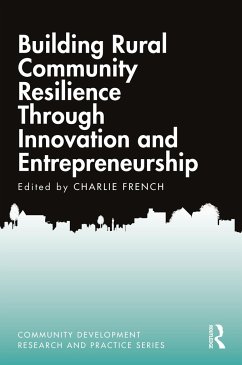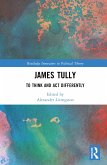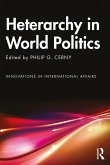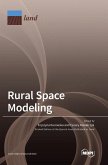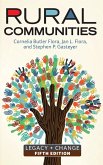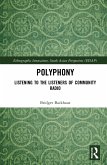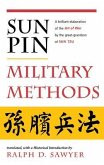Drawing from empirical analyses, case studies, and a synthesis of best practices, this book explores how innovation manifests itself in rural places and how it contributes to entrepreneurial development and resilience. Innovation in rural places may come about as a result of new forms of collaboration; policies that leverage rural assets and address critical service or product gaps; novel strategies for accessing financial capital; infusion of arts into aspects of community life; and cultivation of networks that bridge entrepreneurs, organizations, and institutions. The chapters illustrate how a number of innovation-related characteristics relate to economic vibrancy in rural places such as a strong connection to the arts, adaptive and sustainable use of natural resources, value-chain integrated food systems, robust bridging social capital networks, creative leveraging of technology, and presence of innovation-focused entrepreneurs. Through exploration of these and other topics, this book will provide insights and best practices for rural community and economic development scholars and practitioners seeking to strengthen the rural innovation ecosystem.
Development of new ideas, processes, and products-and the ability to bring them to market through entrepreneurship-is fundamental to the growth and development process and to a vibrant economy. But innovation is an elusive topic, particularly in rural communities. In this volume, leading scholars of rural economic growth and development have come together to discuss various dimensions of innovation, and more importantly, how rural communities can foster a more innovative environment. This is an excellent read for both scholars of rural economics as well as practitioners.
Steven C. Deller, Professor and Community Development Specialist, Center for Community and Economic Development, Department of Agricultural and Applied Economics
An excellent collection of works exploring the important role innovation and entrepreneurship play in community-based rural economic development across the United States. A must read for anyone working in the field of rural economic development.
James C. McConnon, Jr., Extension Specialist and Professor Emeritus of Economics, University of Maine
The premise of the book is that innovation is far more than patent counts. For rural areas across OECD countries that face demographic decline and new forms of competition, innovation by firms, governments and organizations will be key to their future viability. The chapters provide a highly eclectic set of ideas and approaches to rural innovation that help identify ways to increase productivity and revitalize struggling communities.
David Freshwater, Professor Emeritus, Agricultural Economics, University of Kentucky
Most of the discussion about growth and innovation tends to focus on urban advantages, yet the reality is that some rural areas are thriving - or doing better than expected. This collection of articles explores the drivers of rural innovation and ways in which rural communities can support this innovation and bolster their economic outcomes. It is a valuable resource for both researchers and practitioners focused on rural economies.
Heather Stephens, Ph.D., Associate Professor, Resource Economics and Management, West Virginia University
This book provides an holistic, ecosystems-based approach to community-economic development. This work helps us understand how communities-especially rural communities-can create the conditions for innovation and vitality, which is timely and important.
Thaddeus Guldbrandsen, Ph.D., High-Impact Departments, LLC, Formerly Vice Provost for Research and Director of the Center for Rural Affairs, Plymouth State University
Steven C. Deller, Professor and Community Development Specialist, Center for Community and Economic Development, Department of Agricultural and Applied Economics
An excellent collection of works exploring the important role innovation and entrepreneurship play in community-based rural economic development across the United States. A must read for anyone working in the field of rural economic development.
James C. McConnon, Jr., Extension Specialist and Professor Emeritus of Economics, University of Maine
The premise of the book is that innovation is far more than patent counts. For rural areas across OECD countries that face demographic decline and new forms of competition, innovation by firms, governments and organizations will be key to their future viability. The chapters provide a highly eclectic set of ideas and approaches to rural innovation that help identify ways to increase productivity and revitalize struggling communities.
David Freshwater, Professor Emeritus, Agricultural Economics, University of Kentucky
Most of the discussion about growth and innovation tends to focus on urban advantages, yet the reality is that some rural areas are thriving - or doing better than expected. This collection of articles explores the drivers of rural innovation and ways in which rural communities can support this innovation and bolster their economic outcomes. It is a valuable resource for both researchers and practitioners focused on rural economies.
Heather Stephens, Ph.D., Associate Professor, Resource Economics and Management, West Virginia University
This book provides an holistic, ecosystems-based approach to community-economic development. This work helps us understand how communities-especially rural communities-can create the conditions for innovation and vitality, which is timely and important.
Thaddeus Guldbrandsen, Ph.D., High-Impact Departments, LLC, Formerly Vice Provost for Research and Director of the Center for Rural Affairs, Plymouth State University

